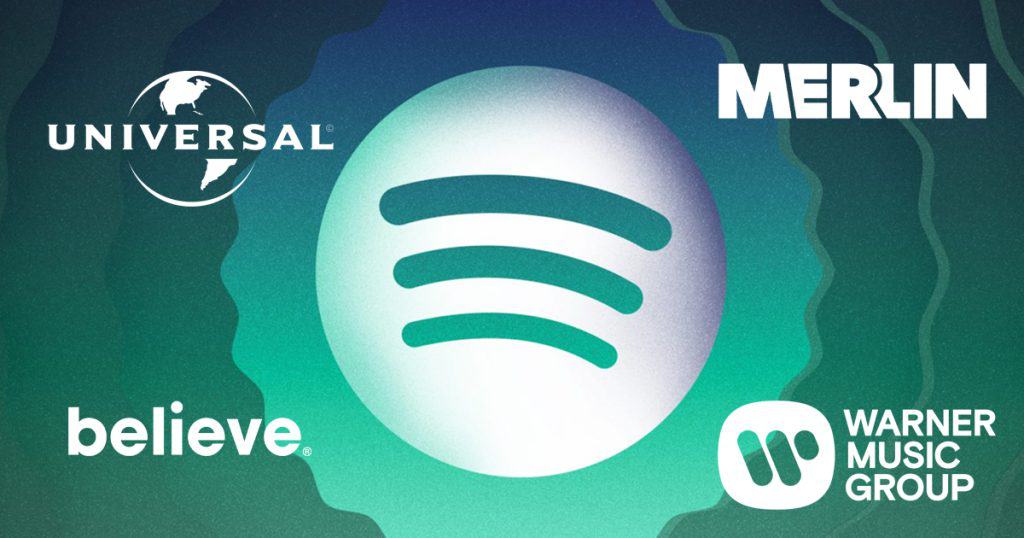Spotify and Major Music Companies Unite to Build “Artist-First” AI Tools
Spotify and the world’s biggest music companies are attempting to draw a new line — not against AI, but in favor of artists.

Spotify and Major Music Companies Unite to Build “Artist-First” AI Tools
Spotify has announced a landmark partnership with the world’s largest music rights holders — Sony Music Group, Universal Music Group, Warner Music Group, Merlin, and Believe — to develop a new generation of AI-powered products designed to serve, not replace, artists.
This hopeful collaboration represents the industry-wide effort to shape how generative AI is integrated into music creation, discovery, and monetization. The partners aim to ensure that artists and songwriters are protected, fairly compensated, and meaningfully included in the development of new technologies that could redefine the future of music.
Building AI Tools With Artists, Not Against Them
Spotify says the move stems from consistent feedback from artists and their teams that existing AI products often feel exploitative or competitive — “short-term experiments built to compete with them,” as the company put it — rather than designed to enhance their careers. The streaming platform has already tested out AI-driven features such as: AI DJ, daylist, and AI Playlist — all built to enhance the fan discovery experience — but this new initiative sets its sights on larger progress and representation by way of:
- Partnerships with rightsholders: New products will be developed through direct licensing agreements, not retroactive negotiations.
- Choice in participation: Artists and rightsholders will be able to decide if and how their work is used in AI tools.
- Fair compensation and transparency: New AI-driven products must create revenue streams for creators, with clear crediting for their contributions.
- Enhancing human creativity: Tools will focus on empowering artists and strengthening fan connections, not imitating, displacing, or replacing human work.
Spotify has also begun building a dedicated generative AI research lab and product team, combining its internal R&D efforts with collaborations across the tech and creative ecosystems. The company says it’s investing heavily to ensure that AI innovation “happens responsibly” — with artists at the center of that process.
Universal Music Group CEO Sir Lucian Grainge praised Spotify’s “artist-centric approach,” noting that it’s vital for the industry to enable AI innovation “within a thriving commercial landscape in which artists, songwriters, fans, and tech companies can all flourish.” Similarly, Warner Music Group CEO Robert Kyncl stressed that “AI must work for artists and songwriters, not against them.”
What This Means for Artists
The speedy rise of AI-generated tracks and deepfakes has raised alarm across the industry, and taken money out of the pockets of hard-working musicians while doing so. This collaboration signals a potential turning point in how AI might shape the next decade of music publishing, as it suggests a shift toward AI as a creative partner — a set of tools that could make audience growth, fan interaction, and monetization more accessible.
If implemented well, this initiative could mean:
- More ethical AI tools that don’t scrape or mimic artists’ work without permission.
- New income streams, potentially through AI-assisted remixing, interactive experiences, or new licensing models.
- Improved visibility for emerging artists through AI-driven discovery that highlights real human creators.
At the same time, the need for clear legislation to protect rightsholders’ property and compensation, across all areas of commercial creativity, remains as critical as ever.
Examining this further from the perspective of the working, independent artist, it’s worth noting that while moves like this are indeed exciting, and mean that corporations do in fact listen when a critical mass of artists voice calls for change, we may want to temper expectations and keep an eye on what these changes end up looking like when they roll out. Those involved represent and back the upper, upper, echelons of income-earning artists on a global scale, and each party’s stake in the success of Spotify’s model suggests this investment wouldn’t be made without a framework of return. How much we can expect anything custom-built around their needs to service the many millions of creators operating independently remains to be known.
Spotify is also reeling from some negative attention around a significant cohort of artists and labels leaving the platform, possibly permanently, both in ethical protest of the exiting CEO Daniel Ek’s investments in military technology and of the company’s often criticized compensation structure. Whether this move is an attempt to deflect from that or meaningfully address the concerns of the artists that power its platform is something to track as time goes on.
Stay hopeful, remain cautious, and pay attention to developments in this field; good things are on the horizon.